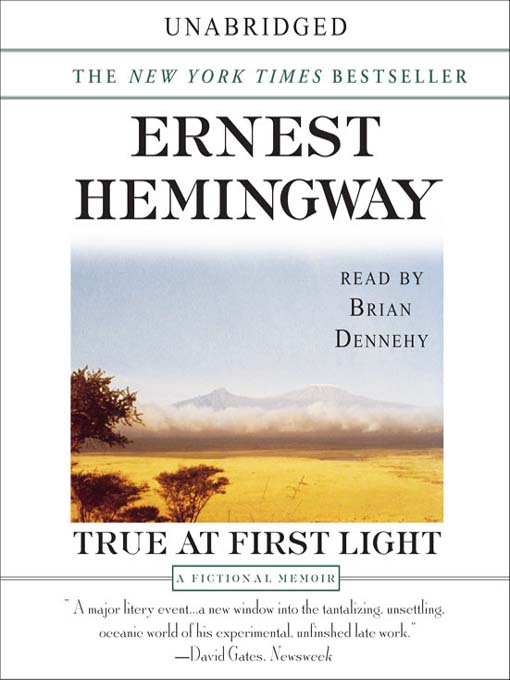
True At First Light
A Fictional Memoir Of His Last African Safari
کتاب های مرتبط
- اطلاعات
- نقد و بررسی
- دیدگاه کاربران
نقد و بررسی

A new Hemingway novel? Well, not exactly, but as close as we can come now that the great one has left us. Patrick Hemingway has edited the 850-page rough text of his father's last novel into what he calls a "fictional memoir" of half that size. It has more the feel of a memoir than of fiction, though, and Brian Dennehy reads it as such. In his matter-of-fact, tough-guy voice he becomes Papa, walking the tightrope between two women, each one accepting the other's role, as Hemingway women dutifully do. Though a fine actor, Dennehy does not act here, unless it could be said he becomes Hemingway the narrator. It is just the author we hear as he helps Mary kill the great, black-maned lion that has been terrorizing the Kamba villages, and then goes with his "supplementary wife," Debba, a beautiful, young native girl, as she searches the market to find a new dress for the birthday of the baby Jesus. It's unpolished and probably not the diamond it might have been if the author had lived, but it's an African jewel nonetheless. P.E.F. (c) AudioFile, Portland, Maine

June 28, 1999
Who wants to go on an 11-hour audio safari with an aging, ego-bloated Hemingway? That's the immediate drawback to listening to this posthumous memoir-turned-novel (edited into its current form by the legendary author's son Patrick). If anyone is capable of breathing life into Hemingway's late tale of big-game hunting with his wife in East Africa, however, it is Dennehy, one of the finest narrators in the spoken-audio field. Here he works to convey the essential nature of Hemingway's character; he contrasts the sparse elegance of Hemingway's descriptive prose style against the more swaggering posture of his ever-present pride. By the time Hemingway wrote this book, he was well aware of his celebrity, his aura, his powers--was able to flatly say, "I love command." Dennehy plays up this self-conscious quality, offering it as a portrait of the author's psyche. It's that sense of performance that makes this audio adaptation spark to life. Based on the 1999 Scribner hardcover.

























دیدگاه کاربران